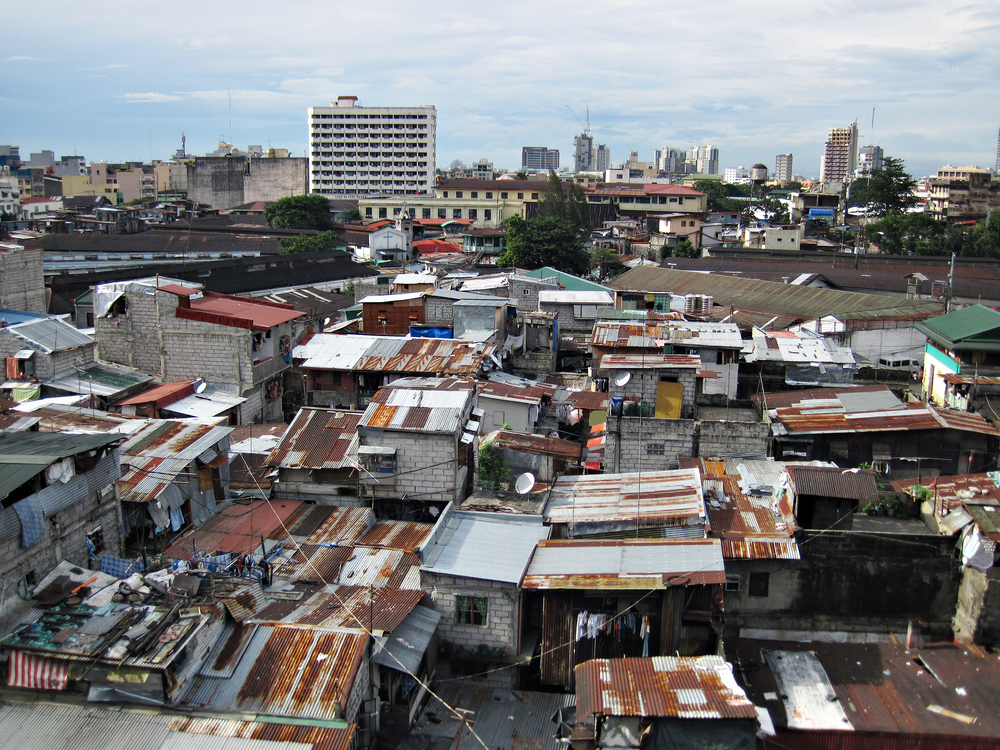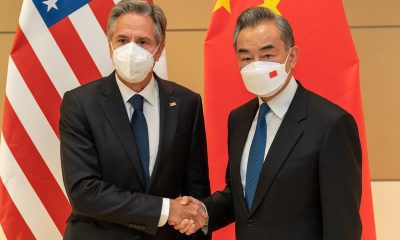Breaking
The Economic Disparity in the Philippines: The rich gets richer, the poor gets poorer
This is a three-part dissection of the Philippine economy. This is Part 3.

An aerial view of Metro Manila showing the slums and buildings of the city (AudioScience / Shutterstock)
MANILA – Filipinos are in for even harder times.
If you are to ask economic analysts, it seems that the next few years will continue to look even grimmer for the Philippines.
As the working class Juan and Juana continue to slave half a day (or more) at work, his/her household tiptoes along the poverty line—trying its best to balance work and make ends meet without falling where millions of Filipino families have an even more difficult life: A life below the poverty mark.
READ: The Economic Intelligence Unit Report (Part 1)
READ: ‘Robust’ might be too strong a word (Part 2)
The rich gets richer, the poor gets poorer
This year, in an ironic turn of events, the Philippines was described as having the “second fastest-growing economy” – only next to its territorial rival China. Economic reports reflected that about US $16.6 billion were added to the Philippines’ GDP.
But where is this so-called growth? Why can’t we—the working class Filipino—feel its effects?
It appears that only the wealthiest individuals and their families can feel this boon in the economy. It’s a terrible cliché, but indeed—the rich just got richer.
According to Forbes magazine, the richest families earned about 13% more in 2014, which translates to about $72.4 billion. If you compute the collective wealth of the Filipinos richest, you’ll get $8.45 billion.
That’s over half of the country’s GDP for the entire year at $16.6 billion.
The gap between the rich and the poor in the Philippines is undeniable. It is a line drawn in screaming red, separating the prosperous and the penurious.
Let’s go down to the basics: First, salary. According to the Department of Labor and Employment (DOLE), the current minimum daily wage is P466 (about CAD $13.35 or US $10.31). It has only increased by a measly 4.5% in the last three years. A 4.5% increase translates to just about P21.00 – about P7.00 per annum.
Partner that measly salary increase with the rising prices of basic commodities and there you have it—the poor just got even poorer. It’s the other half of terrible cliché — an equally sad reality that many Filipinos live everyday.
Second, let’s talk about taxes. As per the Tax Reform Act of 1997 Section 24A , the top marginal income tax rate is at 32% effective January 1, 2000, which is applicable to individuals earning more than P500,000.
At 32%, the Philippines has the highest income tax rate in ASEAN.
In a position paper submitted by the Tax Management Association of the Philippines in 2014, they noted the following income tax rates from neighboring countries:
Singapore – 2%
Vietnam – 20%
Malaysia – 11%
Cambodia – 20%
Laos – 12%
While in Brunei, employees who earn the equivalent of P500,000 do not have to pay any income taxes to the government.
While several officials have made efforts to alleviate the staggering income tax rate in the Philippines, since 1997 the country’s tax laws haven’t budged. However, lawmakers like Sen. Sonny Angara and Sen. Bam Aquino continue to champion bills that seek to change the taxation landscape of the country.
Speaking of lawmakers, let’s go to the third – and perhaps the most notorious – economic factor: Corruption.
Transparency International releases an annual Corruption Perceptions Index (CPI) report to analyze the countries’ corruption problem and to highlight the fact how it is “threatening economic growth for all.” It rates countries from 0 (highly corrupt) to 100 (very clean).
According to the 2014 CPI results, the Philippines got a failing score of 38/100 and ranked 85th out of 175 countries.
“A poor score is likely a sign of widespread bribery, lack of punishment for corruption, and public institutions that don’t respond to citizens’ needs,” it says in the report.
As a consequence of prevailing corruption, the country has “poorly equipped schools, counterfeit medicine, and elections decided by money.”
Furthermore, corruption doesn’t “just steal resources from the most vulnerable – they undermine justice and economic development, and destroy public trust in government and leaders.”
Author’s Note: Exchange rates as of July 20, 2015.






















James Landia
July 21, 2015 at 1:51 PM
The rich gets richer, the poor gets poorer. This is the real situation in the Philippines.
ireneflores88
July 21, 2015 at 1:54 PM
I agree, Filipinos are in for even harder times.
Wilbert Bautista
July 21, 2015 at 1:57 PM
The gap between the rich and the poor in the Philippines is undeniable.
Raymond Arcillas
July 21, 2015 at 1:59 PM
Yes it is a line drawn in screaming red, separating the prosperous and the penurious.
Janine Panlilio
July 21, 2015 at 2:03 PM
This is true that a poor score is likely a sign of widespread bribery, lack of punishment for corruption, and public institutions that don’t respond to citizens’ needs,
Pingback: The Economic Disparity in the Philippines: Economic Intelligence Unit Report » Philippine Canadian Inquirer
Pingback: The Economic Disparity in the Philippines: ‘Robust’ might be too strong a word » Philippine Canadian Inquirer
Pingback: Putting myself in your Shoes |